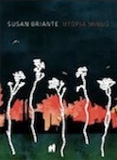May 20, 2012UTOPIA MINUS
Review by Nate Friedman
Ahsahta Press
1910 University Drive
Boise, ID 83725
ISBN 978-1934103197
2011, 83 pp., $17.50
ahsahtapress.boisestate.edu.
Utopia Minus, the second collection of poetry from Susan Briante, takes as its inspiration the throwaway landscape of postmodern America: a boarded up Sunglass Hut, a cell-phone mast, gas station canopy. Briante, coolly observant and dissatisfied, searches for something of the eternal and metaphysical in public restroom scrawl and roadside vegetation.
And the potential for deeply affecting verse is palpable. These poems dare to ask why humans feel empty in the comfort of development, and how to live with the knowledge that development must decay. It is an ambitious and commendable inquiry, but Briante never finds an appropriate balance between sincerity and snark (“O Sunglass Hut, we hardly knew you!”) to give her imagery the strength to work as social comment. The collection’s strongest poems are deeply nostalgic, but the reader is never sure of what. “There are no great cities left in America,” she writes in “Mid-State.” But for which great American cities of the past are we to yearn? She writes about General Sherman’s army raining fire and death in Georgia, and the horticultural finery of Robert E. Lee’s plantation house with some wistfulness. American Indians and Jamestown colonists give way to strip malls and strip clubs, but none of it comes to signify much more than a lazy afternoon rainstorm in the Metroplex. In “Short Lines,” Briante writes that “All the great metaphors have been taken,” and the reader is inclined to think she believes it.
The book, a physically gorgeous paperback from Ahsahta Press, is divided into three numbered sections separated by six open letters, written in margin-justified prose, to such figures as the Surgeon General and the President of the United States. In her memo to the Secretary of Housing and Urban Development, she recalls that “Lifting Farid’s face from my hair to watch him come this morning was the best of the day.” Farid is her husband, and a poet himself. “Farid and I have $15,000 in savings, $40,000 in debt”; inconsequential personal details like these undermine the collection’s purpose, and distract from the struggle for universal meaning that the poems chronicle.
It would be a mistake to discount Briante’s sharp eye for the image. Some lines in the collection are nothing short of astounding. She assures the reader in “I-35” that “A Georgia moon can strip color from the sky, turn a whole landscape into its still-wet negative,” a succulent image for its being so textured and visual. “In the hard soil of childhood, God was everywhere: in pitted sycamores, a vibrating clothes line, in fireflies hung still as lanterns from a Japanese maple”; when she conjures images as salient as these, there can be no question that Briante is a poet of real invention and inspiration. It would seem that Utopia Minus suffers not from a lack of zeal on the part of the poet, but from its over-ambition.
These poems, at their best, have moments of genuine resonance. At times, the beautiful imagery confronts the reader and asks what is gone wrong with the soul of America, why “We are trying to read a dirty world in structures of kinship, in gutted water heaters, in hills of plastic garbage bags.” But Briante can’t have it both ways: either the crumbling infrastructure and listless, quiet tragedies of postmodern society matter in the same way as the mythic history she exalts, or the cataloging of suburban minutia and its various boredoms and anxieties is mere self-absorption–with less poetic meaning and purpose than graffiti on an overpass.